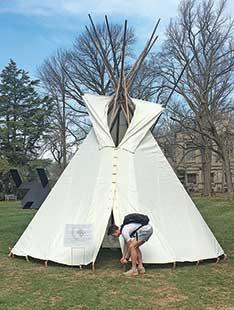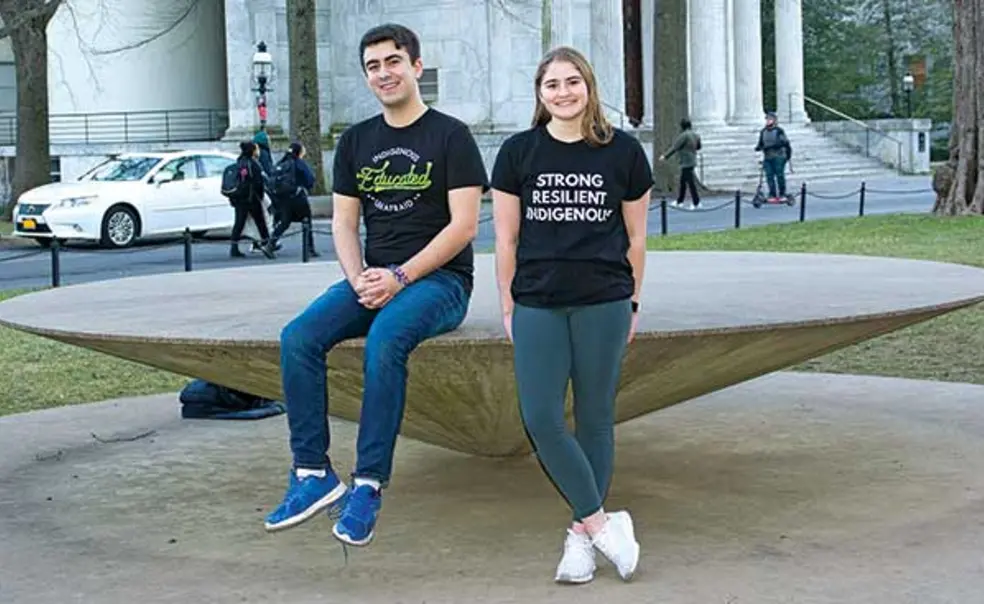Indigenous Initiatives
Students press Princeton to increase Native American enrollment, courses
At Princeton, where just 68 undergraduates identify as having Native American heritage, efforts are underway to increase Native student enrollment and build support for Indigenous topics in the curriculum.
“Princeton is lagging far behind its peer institutions in commitment to creating a healthy Indigenous community on campus, and we believe this should not and does not have to be the case,” wrote the recently founded Indigeneity Task Force in a December op-ed for The Daily Princetonian.
Gabriel Duguay ’22, Jessica Lambert ’22, and Kate Schassler ’21 are leading the undergraduate effort to create an Indigenous studies certificate, increase Princeton’s recruitment efforts within Indigenous communities, and formalize a procedure at the University that would recognize the land Princeton sits on as former Leni Lenape territory.
The group’s initiatives, which began with the creation of the task force in September by the Undergraduate Student Government, come in tandem with the University’s efforts to attract more Native American students and scholars. The task force said Princeton is the only Ivy school without a formal Native American/Indigenous studies academic track or a consolidated website through which interested students can find courses and admission information.
Shawn Maxam, assistant director for diversity and inclusion in the provost’s office, said Indigenous issues and community needs are “central” to Princeton’s diversity efforts. He said the University has established partnerships with programs such as College Horizons and the Santa Fe Indian School Leadership Institute, which invite Native American high-school students to conferences where they learn about college admissions and public policy, respectively. Princeton hosted a College Horizons conference in 2017, and the Woodrow Wilson School has hosted the Santa Fe Indian School Leadership Institute’s summer policy academy for several years.
Maxam said there are tentative plans to unveil a historical land-acknowledgment marker during the 2020–21 academic year — a process that he said would include collaborating with tribal groups.
Jes Norman, a program coordinator at the Carl A. Fields Center, said an expansion of the Brave Voices project — oral histories with alumni of color about their time at Princeton — will focus on Indigenous alumni. Interviews will be conducted over the summer, she said.
The American Studies program is very interested in developing Native American/Indigenous studies at Princeton, with a certificate program as a long-term goal, according to Anne Cheng ’85, director of American Studies. But it will first be necessary to hire scholars in the field, she said, noting that pending hires in the English department and the Princeton Environmental Institute could become joint appointments with American Studies as Indigenous studies scholars.
The “single most effective tool” to develop the necessary administrative support is for students to demonstrate their interest and commitment, Cheng said, citing past efforts on behalf of African American studies, Latino studies, and Asian American studies.

Support for Cheng’s comments came from Sarah Rivett, an English professor whose work focuses on interactions between Indigenous communities and European colonizers, and Tiffany Cain, a postdoctoral fellow who taught a fall-term introductory course on Native American and Indigenous studies in the anthropology department.
“You have to proactively create a cross-disciplinary conversation in order to advocate for a cross-disciplinary field,” said Rivett. “We have a number of people at all levels interested in the field, from undergraduates working on a thesis to senior faculty. What we need to do is talk to each other and make ourselves more visible.”
Without a robust community of Native faculty and students on campus, Cain said, “we might be talking about Indigenous people without Indigenous people at the table.”
Princeton has “a very small number” of faculty who identify as Native American and another race/ethnicity, but the number can’t be disclosed because of privacy concerns, University spokesman Michael Hotchkiss said.
He said the University is “working diligently” to recruit talented scholars from native and Indigenous backgrounds while also participating in national initiatives to increase the number of Native Americans who are receiving Ph.Ds.
Duguay and Lambert, who want to pursue studies in Native American topics as their academic concentrations, said they have been frustrated in trying to build their academic programs.
During the fall semester, there were six courses related to Native American and Indigenous studies with a total enrollment of approximately 70 students. These courses included a “Languages in the Americas” course in the Spanish and Portuguese department.
Rivett and Cain have provided guidance for the Indigeneity Task Force, which, along with groups like Natives at Princeton and the graduate-student-led Princeton American Indian and Indigenous Studies Working Group, is hoping to make the Native American community and scholarship more visible.
So are Native American alumni such as Yolandra Toya ’88, who is hoping to create a comprehensive list of Native American alumni (see Inbox, page 4). She hopes the University will organize a conference celebrating the group, much as it did with its African American alumni and Latino alumni.
“Although the numbers of Native American alumni are small, it appears that many have gone on to do amazing things in their careers, ranging from law to medicine to academics,” Toya said, “and most have returned home to their Native communities to live and work.” She said these alumni could be valuable resources to Princeton.












1 Response
Yolandra Gomez Toya ’88
6 Years AgoCalling Native American Alums
With the recent successes of the Thrive conference at Princeton in October and the ¡Adelante Tigres! conference in 2017 honoring black and Latino alumni, I am hopeful that Princeton will also celebrate the small but influential Native American alumni community of Princeton. I personally know very few Native alumni; however, I am certain that there are many more who attended Princeton. There is not a current list of Native American alumni, so I am writing this letter to invite them to email me at yolandra@alumni.princeton.edu.
With the recent formation of a student Indigeneity Task Force (story, page 14), my hope is that we can return and celebrate our presence at the school and share our successes with each other and the Princeton community.